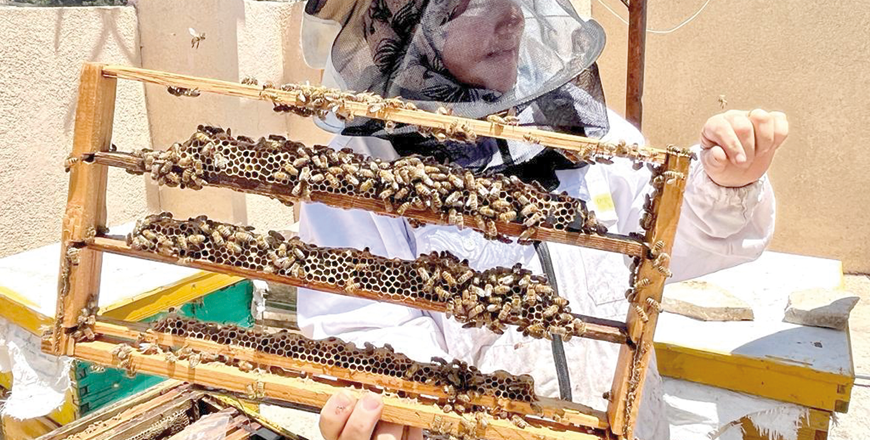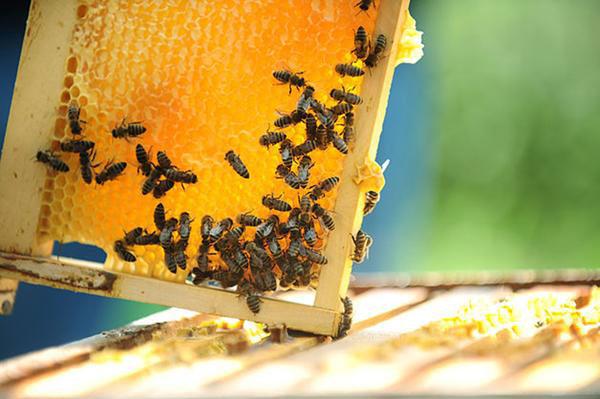You are here
Female beekeeper cultivates Jordan’s honey industry potential
By Camille Dupire - May 23,2018 - Last updated at May 23,2018

Sameera Mouawad is now a proud business owner and trainer of aspiring beekeepers in Al Sukhnah in Zarqa (Photo courtesy of USAID Lens)
AMMAN — When she started working with bees and cattle around 15 years ago, Sameera Mouawad said “she knew nothing about bees or how they work”.
“But I loved honey and I loved watching my neighbours work with bees,” Mouawad, who was the first woman in the Al Sukhnah area in Zarqa to practise beekeeping for a living, recalled.
She remembered that these neighbours kept their bees “in the most primitive ways and didn’t even have protective clothing”.
Pushed by her love for beekeeping and by the need to support her family at a difficult financial time, she started looking for people specialised in modern beekeeping methods that include boxes and frames, which, she said “was a whole other world”.
“I looked at training from the Ministry of Agriculture at first; I worked with them and with IRADA [the Enhanced Productivity Centres Programme from the Ministry of Planning and International Cooperation],” Mouawad recounted, adding that she also received financial help from the Agricultural Credit Corporation to expand her business.
“During that time, I became a member of the Jordan Farmers Union who sent me to Egypt to take beekeeping training. I then started to import bees from Egypt to reproduce and grow, but they eventually stopped the export so I depended on my own bees,” Mouawad told The Jordan Times.
According to the USAID Jordan Local Enterprise Support Project (LENS), which has supported Mouawad in growing and developing her business, “Jordan’s beekeeping and honey production industry has great potential for growth, as many parts of the Kingdom are rich in plants which are great sources of nectar and pollen for bees. However, the industry is still considered in its infancy stage."
A USAID LENS research shows that most beekeepers in Jordan have received little or no formal training in beekeeping and honey production. They also lack adequate marketing and management skills in many aspects such as commercial beekeeping, marketing of bee products, training material and aids, quality control mechanisms, among others.
To improve her skills, she undertook the USAID LENS home-based businesses upgrade training, which aims to “develop the skills of the participants and upgrade their products to prepare them for market linkages and gives them exposure opportunities”, according to the USAID website.
She said the topic she found most useful was food safety “because many women food producers are unaware of it and therefore neglect it”.
“The hardest thing I went through during my journey was being a woman, the rest was doable,” Mouawad stressed, adding “of course, things eventually became easier but it was hard at first because, 15 years ago, it was difficult for a woman to work.”
She is now taking it upon herself to help fellow woman beekeepers by working with interns who find her through the Agriculture Ministry.
“I offer them the space and the bees and train them until they become independent beekeepers,” the businesswoman explained.
Dania Assaf, a graduate in biotechnology and genetic engineering, is one of Muawad’s trainees who found her through the ministry.
“My love for bees inspired me to work in this field. I looked for people who worked in beekeeping and, since there aren't many beekeepers around, most people recommended her,” Assaf remembered, adding “I loved it right away and have been enjoying it so much.”
“I’m so grateful that I found someone who accepted me when I didn’t have any previous experience or background in the field and taught me everything from A to Z. She truly considers me as her daughter,” she said, smiling, noting that Mouawad treats her as her own daughter who also works with her at the farm.
Mouawad underscored that “the most important thing is to focus on what you’re doing and put the time and effort you need to excel. Each person should focus on what they do best and they will receive support from their family and the people around them, just like I did”.
The beekeeper insisted that “it's not just about work, it is also about innovation. Myself for instance, I always try to learn and see new things to develop myself. How can I grow if I don’t take workshops to learn new business skills?”
“A woman should always have willpower when she starts working. If you fail, you need to try again: failure doesn’t mean you should give up and cry; failure should push you to move forward,” the businesswoman insisted, voicing her tremendous happiness to see her product exported to other countries.
“I honestly cannot describe how good it felt to be working and bringing income into my home to help cover expenses which really burdened us back then,” Mouawad rejoiced.
USAID LENS also helped in establishing the Jordanian Beekeepers Association in the northern part of Jordan, aiming to formalise work in the sector and therefore solve many problems including pesticide toxicity to bees, regulating and testing the production of honey, and ending honey laundering scams, according to its website.
It further developed a manual to introduce and diffuse best practices in beekeeping and conducted training programmes for over 600 medium and small entreprises across Irbid, Zarqa and Amman governorates.
Related Articles
JERASH — Around 48km north of Amman in Jerash Governorate, Muna Manfalouti, a beekeeper for nearly four decades, lives a life emblematic of both the undying spirit for Jordanian women and the stark toll of climate change on a treasured trade.
COKEK, Turkey — Beekeepers Mustafa Alti and his son Fehmi were kept busy tending to their hives before wildfires tore through a bucolic regi
AMMAN — Jordan has produced 300 tonnes of honey since the beginning of the year, the Jordanian Beekeepers Association announced on Tuesday.&

















